Gigabyte Z68X-UD3H-B3 Review
by Brendan van Varik on July 11, 2011 7:01 AM EST- Posted in
- Gigabyte
- Motherboards
- Sandy Bridge
- Z68
Dirt 2
Dirt 2 came to the PC in December 2009, developed by Codemasters with the EGO Engine. Resulting in favorable reviews, we use Dirt 2’s inbuilt benchmark under DirectX 11 to test the hardware. We test two different resolutions at two different quality settings using a discrete GPU, and an appropriate integrated GPU setting.
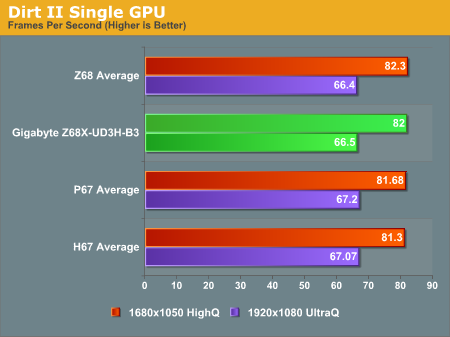
During the testing, I found out that the board performs slightly below average and comes nearer to the bottom of our graph when a 1920x1080 resolution was used. However, whilst testing the lower resolutions where games are more CPU dependent, the board does much better and it averages roughly in the middle.
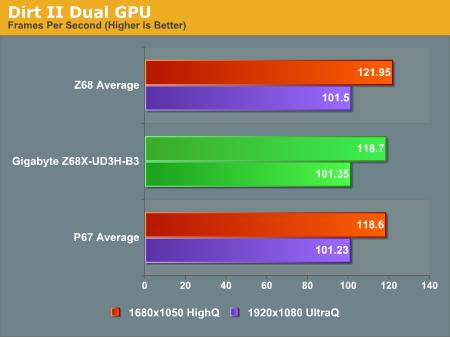
Dual GPU testing reveals that the board is more or less bang in the middle.
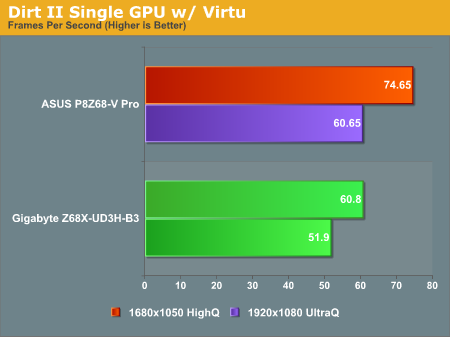
A poor show from Gigabyte. With almost a 20% difference between the ASUS P8Z68-V Pro and the UD3H in the 1680x1050 tests, and a 17% difference in the 1920x1080 tests, this is certainly a weak spot.
Metro 2033
Metro 2033 is the Crysis of the DirectX 11 world (or at least until Crysis 2 is released), challenging every system that tries to run it at any high-end settings. Developed by 4A Games and released in March 2010, we use the inbuilt DirectX 11 Frontline benchmark to test the hardware.
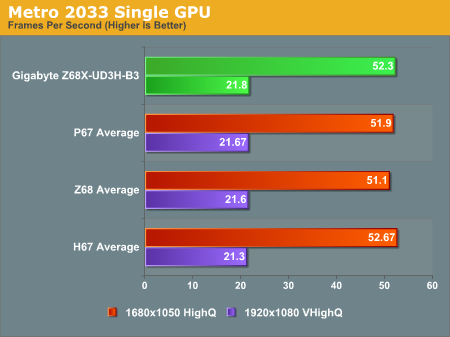
In both of the 1680x1050 and 1920x1080 tests, the Gigabyte Z68X-UD3H did very well with hardly any difference in scores.
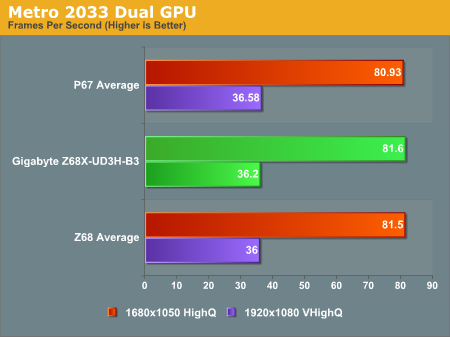
Just like in the DiRT2 tests, the dual GPU tests are some of the best we have seen thus far.
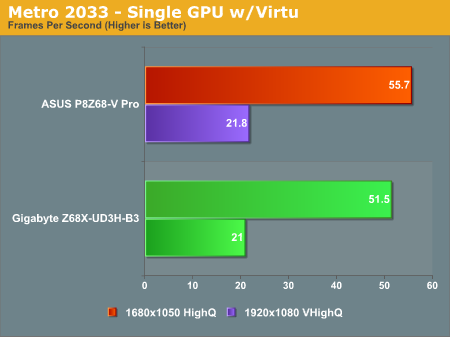
Just like in the DiRT2 tests, the UD3H is unable to produce results which compete against the ASUS P8Z68-V Pro.
iGPU tests
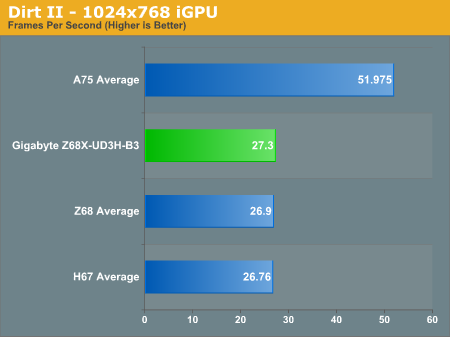
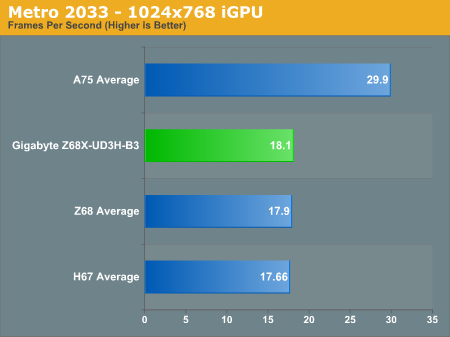
Top spot in both iGPU tests with an i5-2500K for the Gigabyte here, which is always good to see, but the strength of the Llano APU shines through.










70 Comments
View All Comments
DBissett - Monday, July 11, 2011 - link
What is it with using plural verbs following "Gigabyte", as in "Gigabyte have...." and "Gigabyte do....". This sounds atrocious in an otherwise well written article. Verbs should be "Gigabyte has...." and "Gigabyte does...." because "Gigabyte" is a singular noun. Where's the editor?LtGoonRush - Monday, July 11, 2011 - link
Corporations are treated as plural nouns in most English-speaking countries.Death666Angel - Monday, July 11, 2011 - link
Then Anandtech isn't being consistent, because they treat Apple, for example, as a singular entity, see iPad2 and iOS 4.3 reviews ("Apple has...").As a non native English speaker, I agree with DBissett, reading "Gigabyte have..." is not very intuitive and distracts.
Otherwise, nice article. I'm still using a i7 860 and a AMD 5770 and will use those until the 28nm GFX and 22nm CPUs are around.
Snotling - Monday, July 11, 2011 - link
I noticed it too, but "an SSD" is just as bad... its "a SSD"Exodus220 - Monday, July 11, 2011 - link
Actually, you would be incorrect in stating that it should be written "a SSD." The usage of "a" vs "an" is in regards to the beginning vowel sound of a word, not if it begins with a vowel. Since SSD begins with an "es" vowel sound it requires "an" placed before it. Thus, "an SSD" is 100% correct.awaken688 - Monday, July 11, 2011 - link
Yep. 100% correct.roboray - Monday, July 11, 2011 - link
"As a non native English speaker, I agree with DBissett, reading "Gigabyte have..." is not very intuitive and distracts."As a native English speaker, I agree as well. I can count on my fingers the number of times I have seen corporations treated as plural nouns, and it's always a distraction. It makes me suspect that the editor is someone who got their Master's in English without having actually used the language much for anything other than a topic of study. "Proper" or not, it's not common practice, at least in the US.
Jambe - Monday, July 11, 2011 - link
Get over yourself.I like to go all Grammar Nazi from time to time myself, but seriously. This is a trifle.
joshv - Wednesday, July 13, 2011 - link
This is standard British usage. It's just different, it's not incorrect. You will rarely encounter it in writing by American writers, though the British usage is starting to make some beachheads. It's not at all clear to me that or the other way is more proper or correct. The British just interpret corporate entities as representing multiple people - thus plural.DBissett - Monday, July 11, 2011 - link
I disagree. I've been writing in the US for 50 years and the use of singular verbs with corporate names has only recently begun to creep into otherwise good writing. Check any publication you like. Further, AT is very inconsistent in this regard both between and within articles. The responder below points this out. Also, look in this article's summary, where Gigabyte is used with a mixture of singular and plural verbs.